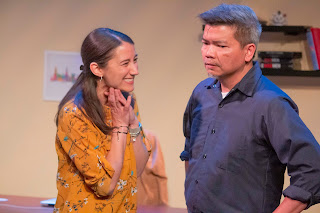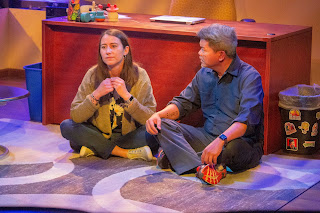Fonseca Theatre Company's 'Fade': Finding your place in society tests the identity you may claim
One of the advantages of white-skin privilege for an American man came home to me as I attended
 |
| Lucia becomes fascinated with Abel's story. |
"Fade" Saturday afternoon: I've never had to choose which aspect of being a white man I need to defend.
I haven't had to apply my status or ambitions, either personal or professional, in order to find a context for them. I'm not proud of this, because I haven't had to do anything to avoid such a burden. For long, it was the default setting for many Americans. For traditionally marginalized groups, an acceptable personal identity has to be claimed, nurtured and defended while resisting imposed constraints and keeping internal and external demons at bay.
It's an ongoing task for the two characters in Tanya Saracho's play, whose production by the Fonseca Theatre Company was pandemic-delayed by two years. They have to sort out even what to call their people, and nothing less than how to properly designate Mexican-Americans, as well as everyone in this hemisphere of Hispanic heritage. The playwright uses "Latinx," production director Jordan Flores Schwartz, in her informative page of program notes, prefers "Latine." The pronunciation of the characters' names (Lucia and Abel) involves agenda-setting choices: how to identify their status, and not only their personal origins, but the origin of those origins: social class, family history, and so on.
"Fade" addresses the specific questions that creative people among Latine must struggle to settle, especially when they seek to place themselves and their narratives within a popular culture still ruled by white men. The play's setting is a lower-level corporate office in Hollywood's signature industry of television, the junior partner to the city's movieland roots. Saracho's personal history overlaps significantly with influences upon Lucia, a novelist seeking TV success, but psychologically conflicted about her prospects. She's out of touch personally with her people, and to some extent with people in general, as she's been used to working from home before moving to Los Angeles from Chicago.
 |
| Ambitious newcomer and janitor get acquainted. |
Over 90 uninterrupted minutes, "Fade" casts Lucia in an increasingly unsympathetic light. She's rightly resentful of the tokenism that limits her horizons. She goes from on edge and unsettled, keenly aware of the low-quality scripts she's barely able to shape, to catching on to how breaking in professionally means, simply, breaking.
Abel lends a sympathetic ear to Lucia's plight. Despite the difference in status, he senses their common
struggle, especially since, like nearly everyone else, he's devoted to pop culture and the narratives it creates about people. Seeing people on TV who look like them is an abiding allure. Abel is cajoled into sharing more and more information about his life, including a background that has made his dead-end custodial job necessary. He reveals personal connections and loyalties that seem remote from Lucia's uprooted, lonely position in the rat race. She comes to regard him as a kind of collaborator, from which exploitation naturally proceeds.
Lara Romero and Ian Cruz gave performances that seemed under scrupulous control by the director and the actors' own insights and energy. If there's a bit of a wind-up-toy feeling to how they present their characters, the playwright is somewhat to blame. She has a lot of social reality to reflect. There is satirical treatment as well as pathos to explore. The dramatic to-do list is extensive for such a short, focused play.
 |
| Abel makes an unwelcome discovery when Lucia's away. |
References to the play's Trump-administration setting come across as extraneous, yet perhaps relevant to Lucia's tendency to overthink her situation. She settles for broad interpretations of her difficulties without looking within. Abel, on the other hand, is embedded in the specific ebb and flow of his life, its pains and its endangered delights. To interpret the world, he looks from his background out; she takes in the big picture too eagerly to assess her proper place in it. She ends up buying into everything she had rejected.
Both characters carry the seeds of what they eventually harvest in revelations and self-awareness. The process comes out in a way that shows one of them treading water, the other advancing. Society puts authenticity in its place when it chafes against marketability and homogenized values. Tony Sirk's costume designs for Lucia are a brilliant marker of the woman's advancing fortune.
Bernie Killian's set has the clean-featured anonymity of a modern, low-level Hollywood office, always ready for the next occupant as the corporation moves its pawns around the board. The bland cheerfulness of Ben Dobler's lighting complements it; his musical soundtrack seems to draw sustenance from the world of the Latin Grammys.
The play's title suggests a camera shot in which a scene's action dims to yield to the next scene. The technique ensures that the audience's attention is temporarily held to one situation, but not too loyal to it. Transition is assured. Something else comes along, and something dear to someone's heart fades as the new thing enters.
"Fade" thus offers a penetrating look at the vagaries of fade-in, fade-out identities. Those who attend this production through next Sunday, whether they share much of Lucia's or Abel's background or not, are sure to be challenged to examine what society compels or permits them to face about who they are. And there's no business like show business for rubbing our noses in identity questions.
Photos: Ankh Productions/Chandra Lynch



Comments
Post a Comment